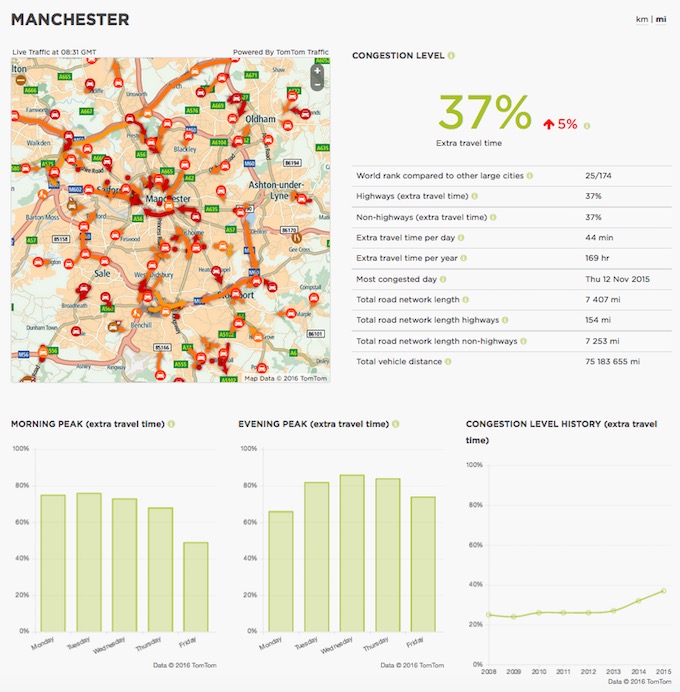up from 5th last year – according to the latest annual Traffic Index from TomTom, which analyses data from Jan – Dec 2015.
Traffic congestion across Greater Manchester is getting worse according to the latest traffic index by Tom Tom.
The TomTom Traffic Index analysed traffic patterns in 295 cities globally and found that Belfast was once again the most congested city in the UK – and 14th worst in the world. Journey times in 2015 were 40% slower than free-flow traffic throughout the day – peaking at 86% longer in the evening rush hour.
London is the 20th most congested city worldwide – and second worst in the UK – with journey times 38% slower, rising to 66% in the evening peak. The Northern Powerhouse of Manchester (37% slower) moves up into third place, overtaking Edinburgh (37%) and Brighton (34%).
“Manchester has been experiencing significant job growth over the last few years with some new large-scale developments, such as Media City,” comments Nick Cohn, Senior Traffic Expert at TomTom. “In 2015, mobility in Manchester was seriously impacted by flooding in August, November and December. So while there has been increased investment in transport options, average road speeds for the year worsened. As in the case of other cities reviewed in the report, TomTom encourages everyone to consider more flexible departure times.
“Average travel times in 2015 on workday mornings from Rochdale or Stockport into Manchester were easily twice the travel times in uncongested conditions. Trips within the main urban area, for example from Central Manchester to the Salford Quays, took on average three times as long during peak periods”.
The five most congested roads in 2015 were
– M60/M62 from M602 in the west to the A627 north-east of the city
– Regent Rd/Dawson S./Mancunian Way
– Albion Way/Broad St
– Princess St/Portland St/Peter St
– Portland St/Newton St

“Transport authorities are managing congestion with well-engineered policies, but you can’t just build your way out of traffic jams”, comments Ralf-Peter Schaefer, Vice-President of TomTom Traffic. “Studies have shown that policies of ‘predict and provide’ are unsustainable. Building new motorways and ring roads doesn’t eliminate congestion. More must be done to better manage existing road space and to spread demand.
“People simply aren’t doing enough to change their travel habits – such as working flexible hours, avoiding peak commuting times, making use of real–time traffic information and trying alternative travel modes.
“If only five per cent of us changed our travel plans, we could improve traffic congestion on our main roads by up to thirty per cent”.
Globally, Istanbul has been knocked off the top spot by Mexico City. Commuters in the Mexican capital can expect to spend 59% extra travel time stuck in traffic during the day, rising to 94% in the evening peak period – a total of 219 wasted hours a year.
The next most congested big cities worldwide are Bangkok (57%), Istanbul (50%), Rio de Janeiro (47%) and Moscow (44%).
TomTom has been collecting traffic data since 2008 and over that period, the UK city that has recorded the largest overall growth in congestion is Coventry – up a staggering 67%. Stoke-on-Trent has seen the biggest increase in rush hour congestion, at 44%.
But Cardiff can give itself a pat on the back, with overall congestion down 19% since 2008.
The TomTom Traffic Index is the only global measurement of congestion comparing travel times between non-congested hours and rush hour periods, for passenger vehicles. It takes into account local roads, main roads and motorways across 295 cities in 38 countries on six continents.







